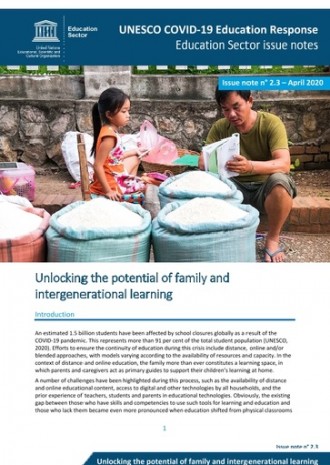A new UNESCO issue note, produced by the UNESCO Institute for Lifelong Learning (UIL) and the Section of Education Policy at UNESCO Headquarters, aims to support education policy-makers and planners in ensuring the quality of learning is maintained in the context of the current pandemic, now and in its aftermath.
Unlocking the potential of family and intergenerational learning argues for the creation of learning families, highlighting lessons from the past and the present, as well as key messages and practical tips for designing effective policy interventions in the education of adults and children.
An unprecedented number of students have been affected by school closures globally as a result of the COVID-19 pandemic. Efforts to ensure the continuity of education during this crisis include distance, online and/or blended approaches, with models varying according to the availability of resources and capacity. In the context of distance and online learning, the family more than ever constitutes a learning space, in which parents and caregivers act as primary guides to support their children’s learning at home.
A number of challenges have been highlighted during this process, such as the availability of distance and online educational content, access to digital and other technologies by all households, and the prior experience of teachers, students and parents in educational technologies. Despite the many challenges, positive experiences have also emerged. In particular, in addition to supporting children’s distance and online home-based learning, many families, depending on their contexts, also rediscovered the joy of learning together and learning from one another about how to stay healthy and safe, cope with stress and uncertainty, strengthen their bonds and acquire new knowledge and skills.
This issue note also demonstrates that in prioritizing the learning of children, we should not ignore the learning needs of adults, especially those with low basic literacy and numeracy skills. Some 773 million youth and adults globally lack basic levels of literacy and numeracy, two-thirds of them women, who shoulder the main responsibility for childcare as well as for children’s learning and schooling at home. Recognizing these issues, the note calls for special arrangements and support for these youth and adults, as part of the distance and online education strategies of governments and international aid agencies.
UNESCO Education Sector’s issue notes cover key topics related to the COVID-19 education response. This is one of the several issue notes to be produced by UIL in collaboration with other units and sectors at UNESCO.
Download issue note Unlocking the potential of family and intergenerational learning
- Author/Editor: UIL
- UNESCO Institute for Lifelong Learning, 2020
- ISBN ED/2020/IN2.3 (document code)

